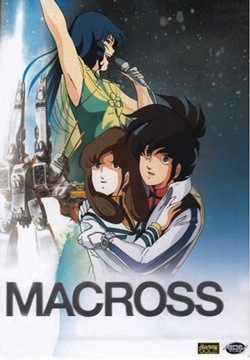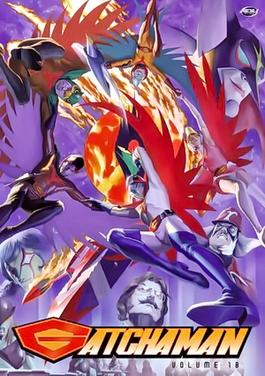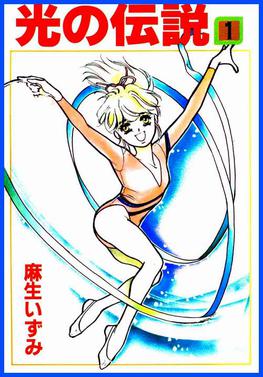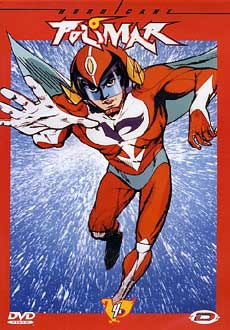
Super Dimension Fortress Macross is an anime television series from 1982. According to story creator Shoji Kawamori, it depicts "a love triangle against the backdrop of great battles" during the first Human-alien war. It is the first part of: The Super Dimension trilogy and the Macross franchise.

Science Ninja Team Gatchaman is a Japanese animated franchise about a five-member superhero ninja team created by Tatsuo Yoshida and produced by Tatsunoko Productions. The original anime series, which debuted in 1972, was eponymously entitled Kagaku Ninja-tai Gatchaman and is best known in the English-speaking world as the adaptation entitled Battle of the Planets (1978). The series had additional English adaptations with G-Force: Guardians of Space (1986) and 2005 ADV Films uncut release. Tatsunoko also uses the official translation Science Commando Gatchaman in related products and media.

Tatsunoko Production Co., Ltd. and often shortened to Tatsunoko Pro, is a Japanese animation and li company. The studio's name has a double meaning in Japanese: "Tatsu's child" and "sea dragon", the inspiration for its seahorse logo.
Kōji Morimoto is a Japanese anime director. Some of his works include being an animator in the Akira film; shorts in Robot Carnival, Short Peace, and The Animatrix; and key animation in anime such as Kiki's Delivery Service, City Hunter, and Fist of the North Star. He is the co-founder of Studio 4°C. He has hosted the independent creative team 'phy' since 2009.
Rintaro is the pseudonym of Shigeyuki Hayashi, a well-known director of anime. He works frequently with the animation studio Madhouse, though he is a freelance director not employed directly by any one studio. He began working in the animation industry—at age 17—as an in-between animator on the 1958 film Hakujaden. His works have won and been nominated for multiple awards, including a nomination for Best Film (Metropolis) at the 2001 Festival de Cine de Sitges.

Tatsuo Yoshida was a Japanese manga artist, illustrator, as well as anime pioneer who founded the animation studio Tatsunoko Production as a businessman and the original author of many anime works.

Generator Gawl is a 1998 12-episode anime television series produced by Tatsunoko Production and the Victor Company of Japan.

Superbook, also known as Animated Parent and Child Theatre, is a Japanese Christian anime television series from the early 1980s, initially produced at Tatsunoko Production and TV Tokyo in Japan in conjunction with the Christian Broadcasting Network in the United States.
Koichi Chigira is a Japanese animator and director who has directed several anime series, usually working with Gonzo and formerly worked at Madhouse. Chigira is best known for directing Full Metal Panic! and Last Exile.

Hikari no Densetsu is a Japanese manga series written and illustrated by Izumi Aso about a girl named Hikari Kamijou who dreams of becoming a national rhythmic gymnastics champion. The manga series title translates into English as "Legend of Light". In the mid-1980s, the manga series was adapted into a nineteen episode anime series produced by Tatsunoko Productions, directed by Tomomi Mochizuki and broadcast on ABC.
Kōichi Mashimo is a Japanese former anime director and the founder of the animation studio Bee Train. Since the creation of the studio, Mashimo directed or otherwise participated in a large number of the studio's works, for example, as a member of the art or sound department.

Gordian Warrior is a Japanese anime television series that aired in 1979 to 1981. There were 73 episodes. It is also referred to as Champion of Gordian or Gardian.

Go-wapper 5 Go-dam is a Japanese mecha anime series produced by Tatsunoko Production and aired in 1976. There were 36 episodes. It is the second installment to Takara's Magne-Robo franchise.

Hurricane Polymar is a Japanese anime and OVA series produced by Tatsunoko Productions. The show was created by Tatsuo Yoshida, who had produced many of Tatsunoko's series. Other romanizations of the name include Hurricane Polymer and Hariken Polymar. Hurricane Polymar is the secret identity of Takeshi Yoroi. He wears a special suit which enables him to fight crime. The suit is made of memory plastic which enables him to assume any shape, including morphing its wearer into 5 different vehicles.
Hisayuki Toriumi, sometimes credited as Eikō Toriumi, was a Japanese animation director, storyboardist, screenwriter, and novelist.

Muteking, The Dashing Warrior is an anime television series produced by Tatsunoko Productions for Fuji TV. It ran from September 7, 1980, to September 27, 1981.

Okawari-Boy Starzan S, or simply Starzan S, is an anime created by Tatsunoko Production from an idea by veteran studio director Hiroshi Sasagawa.

Dareka no Manazashi is a Japanese anime short film written and directed by Makoto Shinkai. It was initially screened at the Tokyo International Forum on February 10, 2013, though it was also shown alongside Shinkai's film The Garden of Words during its Japanese premier on May 31, 2013. It was later posted on YouTube from September 2013 to January 2014. Dareka no Manazashi is a slightly futuristic story about the maturation of a recently independent young woman and her changing relationship with her father. The story develops through reminiscent scenes of their family life and the connection the girl and her father share with the family's cat.

A Town Where You Live is a Japanese manga series written and illustrated by Kōji Seo. It was serialized in Kodansha's Weekly Shōnen Magazine from May 2008 to February 2014 and the chapters collected into 27 tankōbon volumes. The series follows the daily life of Haruto Kirishima as he becomes enamored with Yuzuki Eba.
Sawai is a Japanese surname. Notable people with the surname include:













